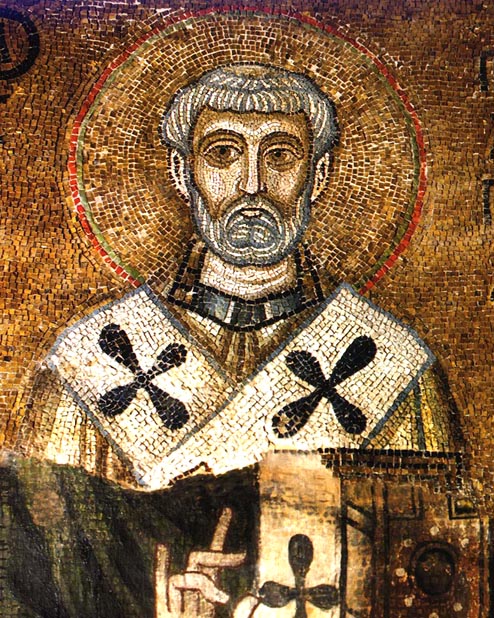Rev. José Mario O. Mandía
jmom.honlam.org
We now begin with the Apostolic Fathers who lived during what is called the “Apostolic Age.” This is the period from around 33 AD to the death of the last apostle, St John, in 100 AD. The Apostolic Fathers are believed to have known the Apostles personally, or at least were greatly influenced by them. Thus, they were held in high esteem, especially the first three: St Clement of Rome, St Ignatius of Antioch, and St Polycarp of Smyrna. Today, we will talk about Clement of Rome.
Clement of Rome was the fourth pope (the third successor of Peter after Linus and Cletus). Different authors vary on the exact dates of his reign as pope, but he could have been in office as early as 88 and died as late as 101 AD. He was imprisoned during the rule of the Emperor Trajan but even in prison, he attended to the spiritual needs of his fellow prisoners. It is believed that he was executed by being tied to an anchor and thrown into the sea.
Only one of Pope Clement’s writings has survived to our day, but it is a very valuable document – the Epistle to the Corinthians. Its author, his name, position and date are all established.
What was his reason for writing? Factions, which Saint Paul spoke about, had started to divide the Corinthians again. Some individuals had rebelled against the church authority and driven them from office. Pope Clement wanted to “settle the differences and to repair the scandal given to the pagans” (Quasten, I, p 43). The letter is significant for several reasons. Let us mention some of them.
(1) Church History. In the first chapter, the author confirms that St Peter did stay in Rome and that St Paul made a journey to Spain. He also recorded the martyrdom of the two. In chapter 6, he spoke about Nero’s persecution of the Christians, pointing out that there were many women among those martyred.
(2) Dogma: Apostolic Succession. The members of the community have no power to depose their bishops because the power is not given by the community but comes from the Apostles. He wrote: “Christ comes with a message from God and the Apostles with a message from Christ.” The power of the bishops is transmitted sacramentally, not by a popular election.
(3) Dogma: Primacy of Peter, Bishop of Rome. The letter does not explicitly declare that Peter occupies a preeminent place among the apostles, or that his successors in the Petrine ministry has primacy over all the bishops. But the existence of the letter shows what authority the bishop of Rome enjoyed in the college of bishops. Clement was writing to another diocese, yet his words reveal the authority he enjoys. “The Church of Rome speaks to the Church of Corinth as a superior speaks to a subject” (Quasten, I, p 46).
(4) Liturgy and the Laity. Pope Benedict XVI points out that “in this early first-century Letter, the Greek word ‘laikós’ (meaning a member of the ‘laos,’ that is, ‘of the people of God’) appears for the first time in Christian literature” (General Audience, 7 March 2007). It is mentioned in the context of the liturgy, where the Pope Clement points out the difference in role of the priests and the laity. “The layman is bound by the rules laid down for the laity.” Hence, in the first century, it was clear that certain functions were limited to the ordained ministers and others to the lay faithful.
(5) Prayer for political authorities. At the end of the letter comes a beautiful prayer. We copy here some passages, in particular the one for authorities. It teaches us how we Christians should regard politics and the State.
“You, O Master, through Your transcendent and indescribable sovereignty, have given them the power of royalty, so that we, acknowledging the honor and glory conferred upon them by You, may bow to them, without in the least opposing Your will.
“Grant to them, O Lord, health, peace, concord, and firmness, so that they may without hindrance exercise the supreme leadership You have conferred on them. For it is You, O Master, O heavenly King of all ages, who confers upon the sons of men glory and honor and authority over the things which are upon the earth. Direct their counsels, O Lord, in accord with what is good and pleasing in Your sight, so that they may piously exercise in peace and gentleness the authority You have granted them, and thus experience Your graciousness.”


 Follow
Follow


